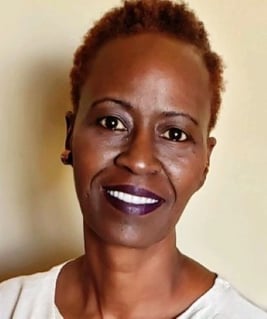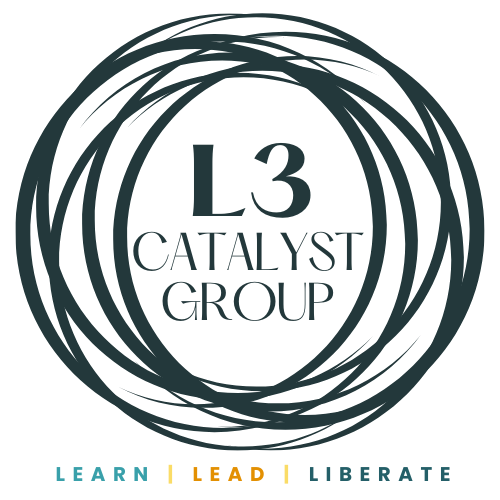Leading for Racial Change Starts Within
Today, we hear from Dr. Trudi Perkins (she/her), a brilliant, brave, and badass human, scholar-activist, racism awareness development coach, and researcher.
Over the last few weeks, we've heard from leaders in our series unpacking L3 Catalyst Group's Ls: Learn, Lead, & Liberate.
At L3 Catalyst Group, we believe that leadership is intention in action. Leadership requires constant curiosity for learning. Everyone can be a leader, irrespective of one's formal position. Leadership is significant and complex. It embraces conflict and is grounded in personal and organizational commitments, values, and vision for change. Addressing this complexity requires everyone's engagement to do their own work for the collective whole.

Heartfelt thanks to you, Dr. Trudi, for sharing your wise reflections with us.
Fellow leaders and learners, I wish you courage, rest, and beloved community along the journey.

“Vision without action is merely a dream. Action without vision simply passes the time. Vision with action can change the world.”
- Joel A. Barker
 This quote by author Joel Barker embodies my approach to just about everything I do in both my personal and professional life. Perhaps what draws me to this quote is the immense opportunity for creativity in any endeavor that I hear in these words that sends my mind racing with ideas for positive change. Maybe It is the spirit of optimism, hope, and the possibility for transformative change that, for me, underlies this thought, even amidst the difficult challenges of equity racial change. This quote also speaks volumes to the perspective that I believe organizational leaders will need in order to not only envision but effectively create workplace cultures that are equitable, inclusive, and free of racial bias. As I contemplate how to help leaders learn to embrace the paradigmatic shifts of a world that is grappling with escalating racial tensions and an imperative for profound societal change, the role of leaders as catalysts for change, becomes even more significant.
This quote by author Joel Barker embodies my approach to just about everything I do in both my personal and professional life. Perhaps what draws me to this quote is the immense opportunity for creativity in any endeavor that I hear in these words that sends my mind racing with ideas for positive change. Maybe It is the spirit of optimism, hope, and the possibility for transformative change that, for me, underlies this thought, even amidst the difficult challenges of equity racial change. This quote also speaks volumes to the perspective that I believe organizational leaders will need in order to not only envision but effectively create workplace cultures that are equitable, inclusive, and free of racial bias. As I contemplate how to help leaders learn to embrace the paradigmatic shifts of a world that is grappling with escalating racial tensions and an imperative for profound societal change, the role of leaders as catalysts for change, becomes even more significant.
Visionary Shifts for Meeting the Challenge
 Conventional approaches for addressing the critical societal issues that spread into workspaces have proven insufficient for inviting new ways of thinking and envisioning the critical work that remains to be done to change organizational culture. They must recognize the evolving dynamics of their roles. Leading for change means committing to equity and antiracism in ways that transcend mere rhetoric. The promises made after George Floyd's murder need not only to be remembered but actively re-committed to and actualized. To embark on this transformative journey, leaders must be willing to undergo an internal paradigm shift, seeing themselves in a new light and acknowledging that their positions demand a deeper level of personal interrogation before they can foster lasting change across their organizations. Embracing the evolving dynamics of a diverse and interconnected world requires a commitment to continuous learning, empathy, and active engagement with the complexities of racial issues. Leaders who embark on this journey not only contribute to the dismantling of systemic barriers but also inspire lasting change within their organizations, promoting a culture of understanding, respect, and unity in the face of societal challenges.
Conventional approaches for addressing the critical societal issues that spread into workspaces have proven insufficient for inviting new ways of thinking and envisioning the critical work that remains to be done to change organizational culture. They must recognize the evolving dynamics of their roles. Leading for change means committing to equity and antiracism in ways that transcend mere rhetoric. The promises made after George Floyd's murder need not only to be remembered but actively re-committed to and actualized. To embark on this transformative journey, leaders must be willing to undergo an internal paradigm shift, seeing themselves in a new light and acknowledging that their positions demand a deeper level of personal interrogation before they can foster lasting change across their organizations. Embracing the evolving dynamics of a diverse and interconnected world requires a commitment to continuous learning, empathy, and active engagement with the complexities of racial issues. Leaders who embark on this journey not only contribute to the dismantling of systemic barriers but also inspire lasting change within their organizations, promoting a culture of understanding, respect, and unity in the face of societal challenges.
Vision With Action Can Change The World
 The need for creating workplace culture change is not a new concept, but the urgency and depth of these efforts demand a novel approach. Traditional methods used for Diversity, Equity, and Inclusion, as well as Anti-racism training, have fallen short of the expected outcomes and have led to many organizations giving up on those efforts. Because the focus of these training sessions remains on providing insights about the problems of racism, without fostering enduring behavior change, many leaders have lost confidence in these programs. It is time for new approaches to building racial awareness and equity that will challenge not only leaders, but members of their teams to put in the personal effort and energy that will offer more intensive experiences of self-interrogation and facilitate the ability for building stronger habits for interrupting racism and bias. This process is not a passive exercise of understanding; it's an active undertaking of taking responsibility for one's biases and initiating behavioral change.
The need for creating workplace culture change is not a new concept, but the urgency and depth of these efforts demand a novel approach. Traditional methods used for Diversity, Equity, and Inclusion, as well as Anti-racism training, have fallen short of the expected outcomes and have led to many organizations giving up on those efforts. Because the focus of these training sessions remains on providing insights about the problems of racism, without fostering enduring behavior change, many leaders have lost confidence in these programs. It is time for new approaches to building racial awareness and equity that will challenge not only leaders, but members of their teams to put in the personal effort and energy that will offer more intensive experiences of self-interrogation and facilitate the ability for building stronger habits for interrupting racism and bias. This process is not a passive exercise of understanding; it's an active undertaking of taking responsibility for one's biases and initiating behavioral change.
Despite the public commitments to anti-racism made by many organizations and their leadership back in 2020, there is a growing number of companies that have begun to pull back on their anti-racism efforts. Some leaders feel overwhelmed by the challenge of improving the culture within their workspaces, and many have given up on the idea of actively engaging with anti-racism and DEIB efforts.  The key to helping leaders learn to embrace the difficult work of racism awareness development lies in a profound shift in practice that compels leaders to begin taking an intense and extensive investigation of their own internal beliefs and perspectives on racism and includes a consistent practice at intercepting racial thoughts and behaviors. Steps that are often neglected in conventional approaches. Many research-based approaches, such as Emotional Intelligence and Positive Intelligence, are helping leaders and their teams tap into unexplored aspects of organizational awareness, creating foundations for the expanded areas of changes that the present moments require. Leaders must also be willing to allocate significant amounts of dedicated time from their demanding schedules to engage in intensive self-study, thus, demonstrating a willingness to go beyond symbolic gestures.
The key to helping leaders learn to embrace the difficult work of racism awareness development lies in a profound shift in practice that compels leaders to begin taking an intense and extensive investigation of their own internal beliefs and perspectives on racism and includes a consistent practice at intercepting racial thoughts and behaviors. Steps that are often neglected in conventional approaches. Many research-based approaches, such as Emotional Intelligence and Positive Intelligence, are helping leaders and their teams tap into unexplored aspects of organizational awareness, creating foundations for the expanded areas of changes that the present moments require. Leaders must also be willing to allocate significant amounts of dedicated time from their demanding schedules to engage in intensive self-study, thus, demonstrating a willingness to go beyond symbolic gestures.
Leading With Vision
The principle of leading by example stands as a cornerstone in creating a culture of genuine change. Leaders who recognize that transformative leadership transcends delegating tasks and even the demanding role of strategic leading, are more apt to realize the types of changes that they want to see in their organizations. This type of change involves active participation in the same extensive journey they expect their employees to undergo. This requires leaders to undergo training first, showcasing a personal commitment. By investing the necessary time and energy for genuine self-examination, leaders set the tone for organizational change, and the leadership team becomes a living embodiment of the values they aim to instill.

 Questions for Consideration to ask Dr. Trudi:
Questions for Consideration to ask Dr. Trudi:
- I've heard of Emotional Intelligence, but what is Positive Intelligence?
- What are some of the promising research-based approaches that leaders can use to foster racism awareness growth and behavior change?
- What are the most common complaints about time commitments required for training programs?
 What Dr. Trudi is reading:
What Dr. Trudi is reading:
- Democracy in Black: How Race Still Enslaves The American Soul by Eddie S. Glaud Jr.
- On Tyranny: Twenty Lessons from the Twentieth Century by Timothy Snyder
- Birth Order by Audrey Miller
 L3 Catalyst Group Blogs Related to Learning, Leadership, and Liberation:
L3 Catalyst Group Blogs Related to Learning, Leadership, and Liberation:
- Staying Curious to Learn by Holly Bechiri
- Leading by Example by Ken Miguel-Cipriano
- Be the Change by Bela Bhasin
- The Essence of Leadership by Glen Guyton
- Learning is Relationship by Natalie Williams
- Creating Learning Environments by Megan Kizer
- Unlearning and Learning
- Leadership + Learning + Perfection

November 22, 2023




Comments